PARALLEL SLIDE GATE VALVES
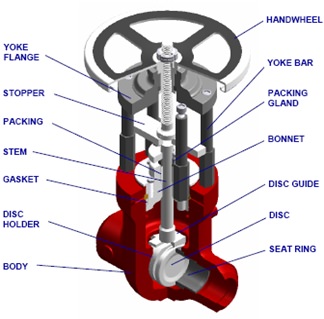
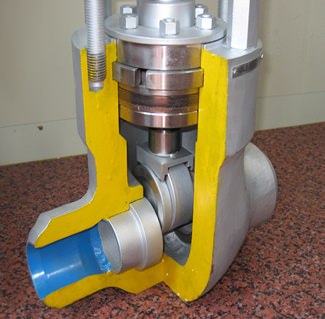
Now ‘parallel-slide gate valve’ is a global trend.
1. The parallel slide gate valve closes with a sliding action instead of the usual compression, so there is no tendency, notch or indent on the sealing surfaces. This result of this action can bring a better tightness to the disc on the seat-ring, and a longer lifetime of the discs and seat sealing surfaces.
2. parallel-slide gate valve has a cleaning function with intimate contact on the seats during the closing action. So if any impurities appear or tendency on the seats and discs, they are eliminated and the sealing contact is free from undesirable particles. It also reduces seat bearing stress and guarantees long life. The wide flat seating can minimize the effect of minor damages on the surface as sealing occurs over the entire surface.
3. No additional power and final surge of torque are required to make the seating leak-tight because sealing is obtained by sliding, not by compression. Furthermore, the valve operates with low energy because there is no need of high energy when opening the valves.
4. Actuator size of the parallel slide gate valve can be much smaller than the wedge type. Hammering or impacting hand-wheels are not usually necessary on this valve.
5. The low torque operation brings less stress and fatigue on the trim. This gives longer lifetime and greater leak-tight reliability.
6. When the valve is closed, the exact position of stem dose not play a great role. As a result, there is no problem with the differences in the thermal expansion coefficient of the materials. Also, the actuators can be stopped with general position switches.
7. The possible jam found in wedge gate valves as result of body contraction will never occur in parallel slide gate valves.
8. In wedge gate valves, the wedge must have positioning guides on its slides to keep it inline while closing under full flow condition. These guides are not usually made of any hard materials, and tend to wear, and eventually may cause jamming.
The problems of solid wedge gate valves:
1. Malfunction of disc opening due to Thermal Binding
In wedge type valves, thermal binding is caused by dimensional interference between wedge and seat, due to temp-erature differences and thermal expansion. Valves are commonly used at high.
2. Leakage problems due to thermal deformation
Since the sealing of the valve is obtained by compression, enough surface pressure between discs and seats is necessary. The bodies should be designed to be thick and strong in order to stand agains.
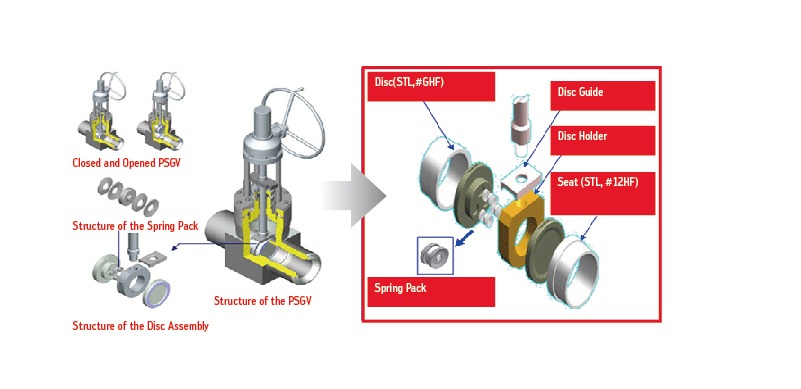
| MAIN MATERIAL | Carbon, Alloy or Stainless Steel Titanium & Nickel Alloy(Hastelloy) Incoloy, Inconel, Monel, Super, Duplex, etc. |
|---|---|
| SIZES FROM | 1/2″ – 24″ (15mm – 600mm) |
| CLASSES | ASME 300 / 600 / 900 / 1500 / 2500 |
| SIZES FROM | Pneumatic, Electrical, Hydraulic Power Operated Parallel |
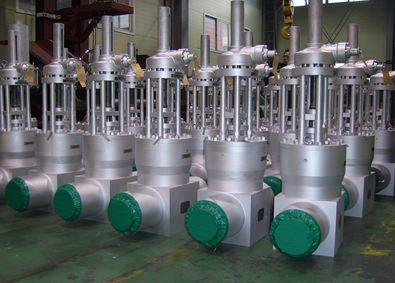
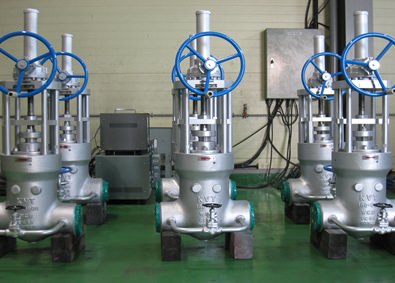
| MAIN MATERIAL | Carbon, Alloy or Stainless Steel Titanium & Nickel Alloy(Hastelloy) Incoloy, Inconel, Monel, Super, Duplex, etc. |
|---|---|
| SIZES FROM | 1/2″ – 24″ (15mm – 600mm) |
| CLASSES | ASME 900 / 1500 / 2500 / 3500 / 4500 |
| SIZES FROM | Pneumatic, Electrical, Hydraulic Power Operated Parallel |
- FORGED STEEL GATE VALVE
| FORGED STEEL GATE VALVE | |
|---|---|
| TYPE | PRESSURE SEAL BONNET |
| CLASS | 1500# – 4500# |
| SIZE FORM | 1/2″ – 24″ |
- FORGED STEEL STOP-CHECK VALVE
| FORGED STEEL STOP-CHECK VALVE | |
|---|---|
| TYPE | PRESSURE SEAL BONNET |
| CLASS | 1500# – 4500# |
| SIZE FORM | 1/2″ – 18″ |
- FORGED STEEL Y-PATTERN GLOBE VALVE
| FORGED STEEL Y-PATTERN GLOBE VALVE | |
|---|---|
| TYPE | PRESSURE SEAL BONNET |
| CLASS | 1500# – 4500# |
| SIZE FORM | 1/2″ – 18″ |



